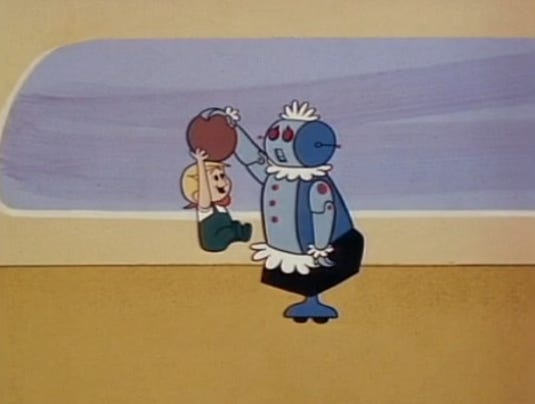ROBOTS: WILL THEY TAKE OUR JOBS?

Apocalypse by Robots is a recurring theme in technical publications and science fiction. As our tools become more sophisticated and able to learn, the more alarmist writers tell us, they might attack us. A machine programmed to make paper clips might try to turn the entire world into a paper clip factory. Robots programmed to find their own power sources could deny us the power we need for survival. Robots could be deadly.
Some of the less excitable tech writers dismiss such alarms,. They still say, though, that say automation will foster mass unemployment. In fact, we’ll need a guaranteed minimum income to save the hordes of technologically unemployed from rioting in the streets because they can’t support themselves. MIT’s Technology Review, Wired, Gizmodo, The Verge, Singularity Hub, Mashable, Ars Technica- almost every technical rag echoes the same theme.
There are a few dissenting voices, but almost every article addressing the subject warns that automation will destroy far more jobs than it will create. In the past, technical development has only disrupted job markets for the short term, and in the long run has created far more jobs– and far more remunerative jobs- than it has destroyed.
But this time it’s different, the alarmists say. We can’t use the Industrial Revolution or the dawn of the Information Age as our model. The big difference now is artificial intelligence or machine learning. As our tools learn from ’experience’, instead of just responding to specific inputs, the need for direct human control nearly vanishes. A small technical and financial elite will control almost everything, and will become fantastically wealthy. The rest of us will be mired in poverty, permanently shut out from the labor force.
How Have Robots Affected Job Markets Before?
This certainly is a grim prospect. But is it likely?
We doubt it. Suppose we concede that the distant past has nothing to teach us about out own futures. We’ll look into just the rise of robotics in the last sixty years. In all that time, robots have finally and irrevocably destroyed only one job category, elevator operators. But automation has created more jobs for elevator engineers and repairmen.
We’ve seen the same trend in other industries. Replacement of land lines with mobile phones has radically altered the work of telecom technicians, but has not made them obsolete. Replacing cathode ray tubes with LCD, LED, and OLED TV sets radically shrank the market for TV repairmen, but created new jobs for electronics designers and coders. The waning influence of broadcast TV networks has opened new markets in cable TV, satellite TV, and streaming video,. It has created more demand for content– and for content creators.
Automation has brought us an enormous blessing: assignment of the most dangerous, dirty, exhausting, and boring tasks to machines. This leaves us with far less onerous work, often in air-conditioned comfort. Machine learning will accelerate this trend. The tasks we handle in the future might not be what we call ‘work’ today. They might even seem like play. But suppose you could enter a time machine, and could talk with a farmer or a merchant living two centuries ago. If you describe your current job to him, will he understand it? Will he consider it work? Not likely. He’ll probably think you’re just playing.
What Can You Do?
This doesn’t mean you should be complacent. If you’re unprepared, a rapidly changing job market can hurt you badly. Your best job insurance is continually upgrading your skills.
Above all else, learn how to learn. We can’t always predict what occupations will be in demand. Students who spend years preparing for specific jobs in trendy fields often find, not long after they graduate, that their hard-won skills are obsolete. If you have solid communication, math, and reasoning skills, and if you know a fair amount about literature and history, you have a huge advantage over others. What you don’t know, you can learn quickly.
With a nimble mind and a solid work ethic, you probably don’t need to fear competition by robots.
(If you need a reliable internet connection, talk to us. We can help.)



